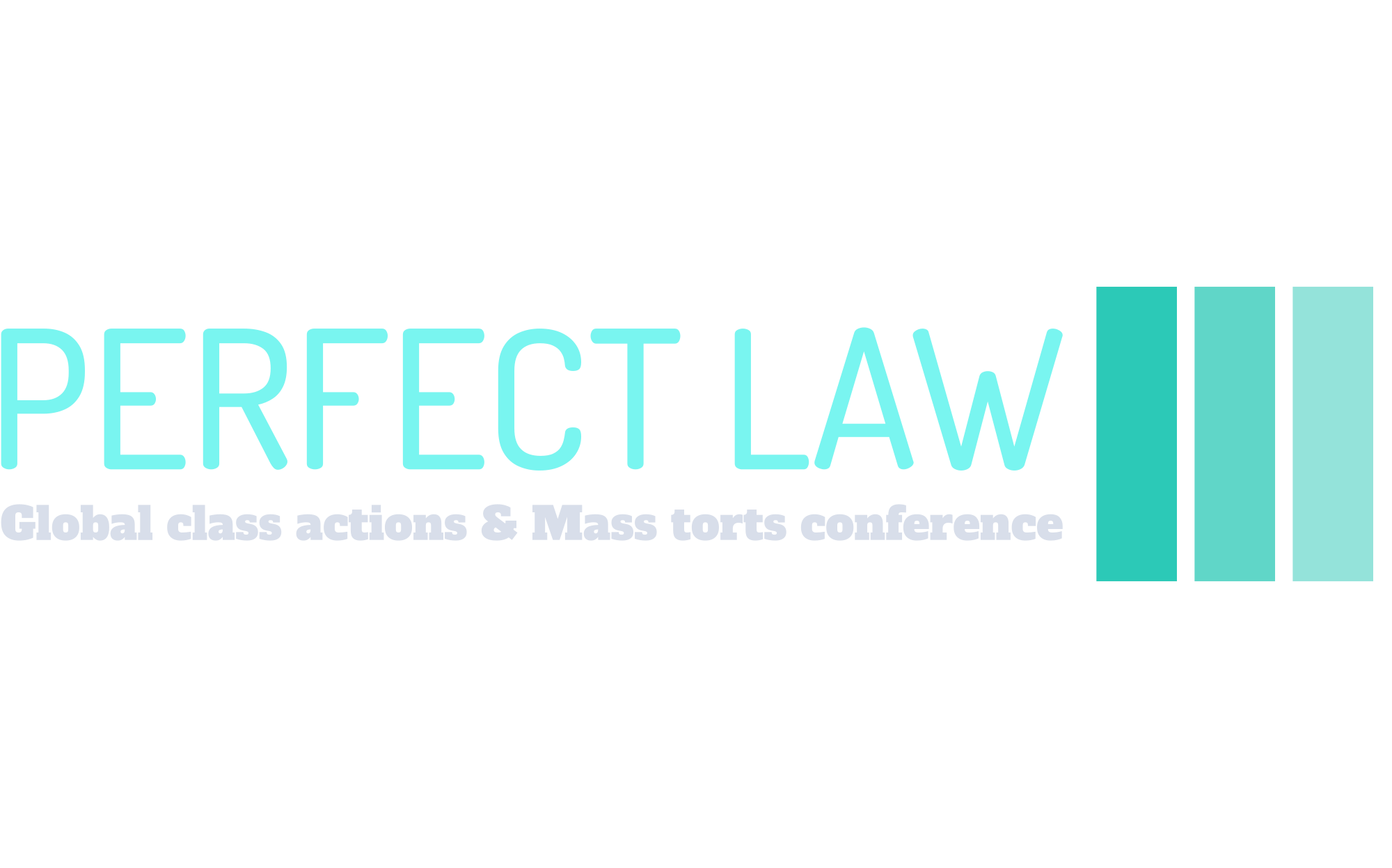Day 2: Session B – Logistics of Class and Mass Tort Actions
The second parallel session dealt with the technicalities of managing a class action. After a warm welcome by Steven Weisbrot of Angeion on behalf of the conference board, the first panel opened with a discussion of pre-action services through investigations and reliance on statistical data. Chaired by Paul Karlsgodt of BakerHostetler, the panel first explained the basic instruments to furnish statistical evidence – surveys, hedonic regression analysis, event studies, and the like – before turning to more specialized matters. Dante Quaglione of BRG expanded on the usefulness and limits of the “broad axe” concept, which is the notion that courts should do the best they can with the evidence available to them, rather than requiring calculations and data at a granular level of detail. CEG’s Thierry Wetzel and Kimela Shah of Oxera explored different approaches to investigation. In this regard, Kimela Shah recommended to start building the necessary data set as early as possible, especially in situations where the infringement is still ongoing, as crucial data might otherwise get lost. Michelle Clark of Willkie Farr & Gallagher added a legal perspective on the topic and reported the recent developments in the UK’s collective proceedings regime, where the statistical methodology is the focal point of many recent decisions (e.g., the Gutmann boundary fares case or the ro-ro shipping cartel).
The second panel dealt with discovery and e-discovery as means to substantiate a claim. Sub-standard data, the benefits of structured data, and the avoidance of “data dumps” were the topics the discussion revolved around. Regarding the latter, Ariana J. Tadler (Tadler Law PPL), who chaired the panel, advised to always talk to the opposing party at an early stage to keep discovery lean. Taking a deep approach to discovery rather than a broad one, and knowing where to look for first was another valuable lesson from her practice she shared with the audience. George Peretz KC, Monckton Chambers, related his “nightmarish” experience of doing digital discovery with government agencies due to their organization (or lack thereof) of data. Phil Beckett of Alvarez & Marsal called to mind that structured data, which could be the subject of discovery or disclosure, extends far beyond e-mails and Word documents: customer relation systems as well as trading and finance systems very often contain a wealth of data, there for the taking and easy to use. Drew Lewis of Disco brought in Salesforce data as an example and added that other means of communication, such as Slack and Teams, should always be kept in mind when conducting discovery.
The administration scheme and notice to class members were the subject of the third panel. Steven Weisbrot of Angeion, chair of the panel, stressed the imperative to inform the public in layman’s terms and to keep a well-trained staff on hand to respond to questions quickly. Katja Nikolaus of June outlined the current situation in Germany, where claims administration and notification are still in their infancy – as is collective redress in general – and where it is often difficult to convince consumers of the benefits of collective action. Clare Ducksbury of Case Pilots contributed her UK experience, highlighting the legal difficulties of contacting class members, which could easily be qualified as a prohibited form of advertising legal services, putting emphasis on the class representative being the one who contacts the class members as a potential way around this pitfall. Top Class Actions’ Scott Hardy emphasized the importance of regular updates for the class members, so as to keep attrition rates manageable. All in all, the panelists were at pains to underline the need for open and unobtrusive communication, not only to deny the opposing party a potential opening for an attack but also to gain the trust of the class members at a time when spams and scams abound.
The fourth panel, chaired by Charles Marr of Epiq, explored the distribution of damages. The detection of fraudulent claims was a big issue: Christine Azar of Rust Consulting cautioned, however, that not every incorrect claim is necessarily a fraud, and factors such as the demographics of the addressed group of claimants have to be kept in mind. Christopher Neill, Pogust Goodhead, expanded on further techniques to discover and fight fraudulent claims. As to the actual distribution of damages, Epiq’s Loree Kovach explained that the value of the claim can influence the method of distribution claimants accept as appropriate. She also underlined the need for a back-up plan vis-à-vis any residual, such as a charity with a discernible link to the cause of action. Overall, the quest for achieving high claim rates was a recurring theme in the panelists’ contributions. In this regard, the panel expressed their hopes to see a high number of settlements in the UK’s CAT in the future, a sentiment which had also been voiced by other panels.
After lunch, the fifth panel handled a large variety of questions on lead counsel selection, carriage disputes, competing claims, and lawyer fees under the guidance of Louise Trayhurn, Legis, as chair. First, Paul Lomas, member of the CAT, gave account of the two carriage disputes which so far have emerged in the CAT (Forex cartel and truck cartel). An aspect he touched upon was the difficulty to decide a carriage dispute on topics such as funding and ATE as, so far, the proposed class representatives had been more than happy to go and get more funding. Next, David Greene of Edwin Coe called to mind the rapidly changing legal landscape in England and Wales in the last 30 years and the history of carriage disputes in the English group litigation regime, where the claimants’ lawyers are expected to come to terms. Accordingly, he predicted an ever-greater need for cooperation amongst lawyers on the claimant side for the future. Larry King of Kaplan Fox & Kilsheimer provided an American view and reported an interesting development: increasingly, diversity of representation is also an issue for courts when appointing class counsel.
The sixth panel, chaired by Carla Peak of KCC, revolved around legal technology services for class actions and public relations. Clive Coleman, Maltin PR, confessed that as a former journalist, he was drawn to class action cases because they make great stories. From a storytelling point of view, he highlighted the social justice element of taking on big companies for the greater good. Gus Sellitto of Byfield Consultancy commented that the recent growth of collective redress in the UK has resulted in a backlash for law firms, naming the age-old tropes of “ambulance chasers” and “compensation culture” as examples. He also cited the recent student group litigation as an example of a particularly well-exercised litigation campaign, pointing out the usage of student newspapers and the placement of very personal stories of the students’ plight in national newspapers. Pete Janes of Shieldpay shared his experience as a provider of legal technology services, especially regarding the distribution of damages: he cautioned against promising a specific amount of money to claimants, as false or unrealistic expectations can result in bad PR if the amount ultimately distributed is lower.
The conference concluded with the seventh panel on the assignment of claims. Professor Geraint Howells of the University of Galway chaired this last panel, whose topic is of special importance to some continental European jurisdictions. Anja Meier-Hoffmann of Hengeler Mueller reconstructed the rise of the assignment model in Germany and highlighted the increased acceptance of the model in recent years by the Federal Court of Justice. Giorgio Afferni of Delex explained different business models in Italy and predicted that a full monetization of claims, while being riskier for the purchaser due to the associated high initial costs, might see a rise in popularity in the future, as typical legal risks such as conflicts of interest cannot arise. Both agreed that the assignment model represents a valuable alternative in jurisdictions where the statutory collective redress regimes only provide unsatisfactory solutions. Damiën Berkhout of Lindenbaum added that, in the Netherlands, the assignment model and the mandate model coexist alongside the successful and popular WCAM and WAMCA regimes. He reported that the assignment model is used as a handy and flexible alternative for certain types of claims, as the restrictions of the WAMCA – such as the scope rule or the representativeness requirements – do not apply. The panelists agreed that, despite the upcoming implementation of the Representative Actions Directive, the assignment model is here to stay, at least for the foreseeable future.
Overall, the conference provided a unique forum for inspiring debate and exchange about the latest developments in the class actions and mass tort space in Europe and the world. Thanks to the excellent speakers and the equally impressive caliber of participants from across the globe, the conference has lived up to its aspiration of being the preeminent event of its kind. The next Global Class Action & Mass Torts Conference is scheduled for mid-May 2024. Mark your calendar.
Anton Burri,[1] Johannes Nickl,[2] Adrianus van Heusden[3]
[1] Faculty of Law, University of Lucerne, Switzerland.
[2] Faculty of Law, Heidelberg University, Germany.
[3] Rotterdam Institute of Law and Economics, Erasmus University Rotterdam, The Netherlands.
Foto Credit: Philip Pankhurst






